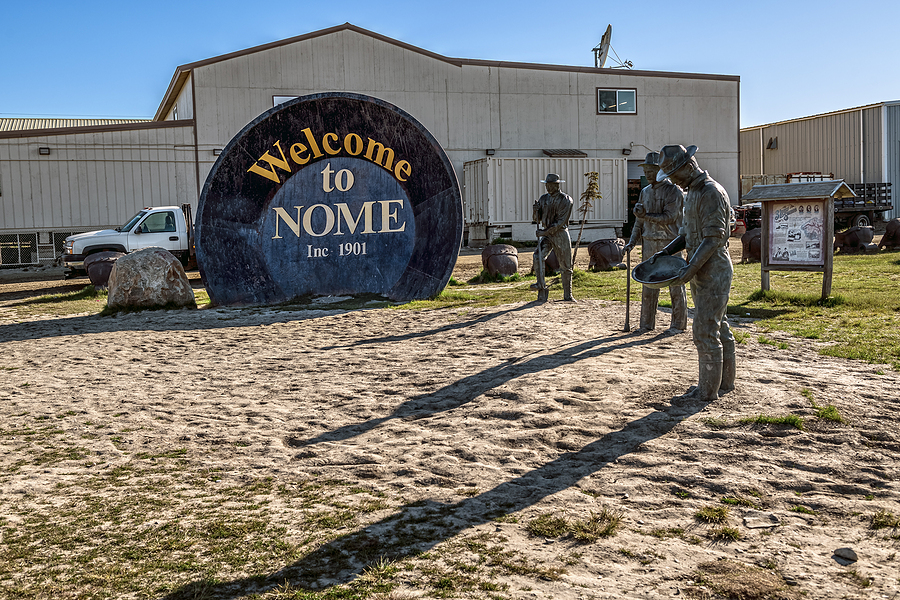
A Solution to a Multifaceted Issue
The remote city of Nome, Alaska is home to only a few people and is located over 500 air miles from the nearest medium sized city. Due to these conditions, collecting e-scrap has proven challenging, however, a tribal nonprofit and an airline have found a unique solution.
Beginning with routes from Nome to Anchorage, Alaska Airlines is now loading e-scrap into the belly of its planes as a type of ballast. Instead of adding weight by using water, as previous protocol required, e-scrap is now being utilized to ensure that the center of gravity and balance of the aircraft is adjusted accordingly.
This solution resolves both an ecological and logistical conundrum for this locality, which is situated six times nearer a sparsely inhabited area of Russia’s mainland in comparison with its own state capital.
Caitlin Auktweenna “Auk” Tozier, a ramp agent for Alaska Airlines in Nome, highlights the value of respecting the land and nature. She comments, “any recyclables we can carry out won’t have to remain in this community, where we don’t have the resources to process them.”
E-Scrap Instead of Water
With a population of 3,600, the Alaskan town of Nome is home to Kawerak, Inc., a nonprofit services provider governed by and serving local Native peoples. This organization is responsible for the collection and preparation of e-scrap shipments from the area. Additionally, Kawerak employs Tozier as its technology specialist who initially thought of substituting e-scrap instead of water to load ballast on outbound flights.
A recent write-up revealed to Tozier that in the past, shipments of e-scrap had to stay idle for considerable amounts of time, until a barge was available to transport the discarded items to a recycling facility near Seattle.
In an interview with E-Scrap News, Alaska Air Cargo’s director of sales and marketing, Rick Bendix, stated that Kawerak believes Nome and its neighboring towns generate around 50,000 pounds of e-scrap annually. “This volume does not replace all of our ballast needs, but does replace the majority of it,” he stated. Alaska Air Cargo later ships e-scrap from Anchorage to Seattle for proper recycling.
Similar to how ocean shipping lines have handled recycling for U.S. municipalities, backhaul is a technique that has been adopted to manage corrugated cardboard, paper and plastic products.
In the past, container ships would arrive from Asia to U.S. ports laden with cargo. However, there has been a decreased demand in transporting goods back to the eastern side of the Pacific Ocean. Before heading home, these vessels are required to fill their hulls with ballast, and U.S exporters have taken full advantage of this requirement by obtaining inexpensive rates on bales of recyclables.
Acknowledging Battery Concerns
The partnership between Kawerak and Alaska Air Cargo has a driving a focus on e-scrap, which mostly consists of flat-screen TVs and monitors, as well as projection TVs, printers and copiers. While laptops and cell phones are not included, due to safety considerations related to battery fires, CRT TVs are still accepted.
Bendix explained that the airline ensures that rigorous sorting techniques are employed to ensure all e-scrap does not contain hazardous lithium-ion batteries, capable of igniting during flight. He said “Kawerak has a very strong sorting process to ensure they are only given us items that are not regulated for shipping by air.”
“The cargo also goes through an inspection process by Alaska Airlines personnel in Nome who are trained to be aware of and on the lookout for hazardous items during the acceptance process,” he added.
Nome has found an environmentally friendly way to manage its logistics due to the backhaul process. In this area, landfills have very limited capacity so burning garbage is frequently conducted to retain space.
“Materials come into our communities and they never leave,” said Anahma Shannon, Kawerak’s environmental program director. “Heavy equipment, lead-acid batteries, electronics, all these things – it’s so expensive to get them here, and nobody’s going to pay to get them out when they’re not worth anything. Our communities just get full of materials that aren’t good for their environment.”
Additionally, Kawerak has been actively involved in a collaborative effort with Bering Air to transport various materials from the smaller villages of the region to Nome. These cargo items have included e-scrap, lead-acid batteries, and fluorescent bulbs.
“By creating a system to get recyclables out of our communities, we’re helping them maintain a clean environment which improves human health,” Shannon said.
